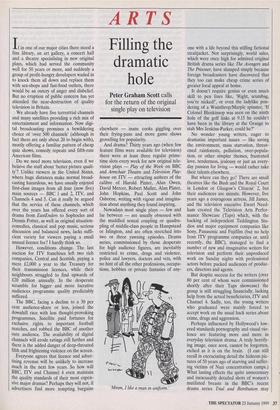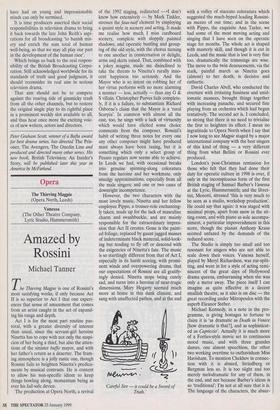ARTS
Filling the dramatic hole
Peter Graham Scott calls for the return of the original single play on television If in one of our major cities there stood a fine library, an art gallery, a concert hall and a theatre specialising in new original plays, which had served the community well for 50 years or more, and suddenly a group of profit-hungry developers waded in to knock them all down and replace them with sex-shops and fast-food outlets, there would be an outcry of anger and disbelief. But no eruption of public concern has yet attended the near-destruction of quality television in Britain.
We already have five terrestrial channels and many satellites providing a rich mix of entertainment and information. Now digi- tal broadcasting promises a bewildering choice of 'over 500 channels' (although in fact there are only about 20 to begin with), mostly offering a familiar pattern of cheap quiz shows, comedy repeats and fifth-rate American films.
Do we need more television, even if we believe the stuff about 'better picture quali- ty'? Unlike viewers in the United States, where huge distances make normal broad- casting hazardous, we have usually enjoyed first-class images from all four (now five) main sources — BBC 1 and 2, ITV, and Channels 4 and 5. Can it really be argued that the service of these channels, which over the years has offered every sort of drama from EastEnders to Sophocles and Dennis Potter, as well as original situation- comedies, classical and pop music, serious discussion and balanced news, lacks suffi- cient variety for viewers paying a small annual licence fee? I hardly think so.
However, conditions change. The last auction for ITV franchises left two rich companies, Central and Scottish, paying a mere £2,000 a year to the Treasury for their transmission licences, while their neighbours struggled to find upwards of £20 million annually. In the desperate scramble for bigger and more lucrative audiences programme quality predictably suffered.
The BBC, facing a decline to a 30 per cent audience-share or less, joined the downhill race with less thought-provoking programmes. Satellite paid fortunes for exclusive rights to important football matches, and robbed the BBC of another sure audience. The availability of digital channels will erode ratings still further and there is the added danger of deep-throated filth and frightening violence on the screen.
Everyone agrees that licence and adver- tising revenue will be unlikely to increase much in the next few years. So how will BBC, ITV and Channel 4 even maintain the quality standards of their most expen- sive major dramas? Perhaps they will not, if advertisers find more tempting bargains elsewhere — inane cooks giggling over their frying-pans and more game shows grovelling for popularity.
And drama? Thirty years ago (when few feature films were available for television) there were at least three regular prime- time slots every week for new original tele- vision plays — Play of the Week on BBC and Armchair Theatre and Television Play- house on ITV — attracting authors of the calibre of Harold Pinter, Alun Owen, David Mercer, Robert Muller, Alan Plater, John Hopkins, Paul Scott and John Osborne, writing with vigour and imagina- tion about anything they found inspiring.
Nowadays most single plays — few and far between — are usually obsessed with the muddled sexual coupling or quadru- pling of middle-class people in Hampstead or Islington, and are often stretched into two or three yawning episodes. Drama series, commissioned by those desperate for high audience figures, are inevitably restricted to crime, drugs and violence, police and lawyers, doctors and vets, with no hint of all the other professions, occupa- tions, hobbies or private fantasies of any- Mmm, I like a man in uniform. one with a life beyond this stifling fictional straitjacket. Not surprisingly, world sales, which were once high for admired original British drama series like The Avengers and The Prisoner, have slumped simply because foreign broadcasters have discovered that they too can make cheap crime series of greater local appeal at home.
It doesn't require genius or even much skill to pen lines like, 'Right, scumbag, you're nicked!', or even the ladylike pon- dering of a Wainthrop/Marple spinster, 'If Colonel Blenkinsop was seen on the ninth hole of the golf links at 9.15 he couldn't have been in the library at the Grange to stab Mrs Jenkins-Parker, could he?'
No wonder young writers, eager to dramatise important issues — like saving the environment, mass starvation, threat- ened rainforests, pollution, over-popula- tion, or other simpler themes, frustrated love, tenderness, jealousy or just an every- day passion for living — would rather take their talents elsewhere.
But where can they go? There are small theatres like the Bush and the Royal Court in London or Glasgow's Citizens' 2, but their audiences are minute. However, five years ago a courageous actress, Jill James, and the television executive Ewart Need- ham created the Television Arts Perfor- mance Showcase (Taps) which, with the backing of independent Teddington Stu- dios and major equipment companies like Sony, Panasonic and Fujifilm (but no help from ITV programme companies or, until recently, the BBC), managed to find a number of new and imaginative writers for television and perform their unproduced work on Sunday nights with professional actors before packed audiences of produc- ers, directors and agents.
But despite success for the writers (over 80 per cent of whom were commissioned shortly after their Taps showcase) the group is still struggling financially, lacking help from the actual beneficiaries, ITV and Channel 4. Sadly, too, the young writers who graduated were mainly forced to accept work on the usual hack series about crime, drugs and aggression.
Perhaps influenced by Hollywood's low7 ered standards pornography and visual vio- lence are featuring more and more in everyday television drama. A truly horrify- ing image, once seen, cannot be forgotten, etched as it is on the brain. (I can still recall in excruciating detail the hideous pic- tures of 50 years ago of starving and suffer- ing victims of Nazi concentration camps.) What lasting effects the quite unnecessary and inexcusably detailed shots of women's mutilated breasts in the BBC's recent drama series Trial and Retribution may have had on young and impressionable minds can only be surmised.
It is time producers asserted their social responsibilities in television drama to bring it back towards the late John Reith's aspi- rations for all broadcasting 'to banish mis- ery and enrich the sum total of human well-being, so that we may all play our part in the development of the human race'.
Which brings us back to the real respon- sibility of the British Broadcasting Corpo- ration. Still acknowledged worldwide for its standards of truth and good judgment, it should reconsider its real aim in serious television drama.
That aim should not be to compete against the roaring tide of gimmicky trash from all the other channels, but to restore the original single play to its rightful place in a prominent weekly slot available to all, and thus hear once more the exciting voic- es of new writers, actors and directors.
Peter Graham Scott, winner of a Bafta award for best drama series, has directed The Pris- oner, The Avengers, The Onedin Line and produced and directed many other series. His new book, British Television: An Insider's Story, will be published later this year in America by McFarland.



























































 Previous page
Previous page